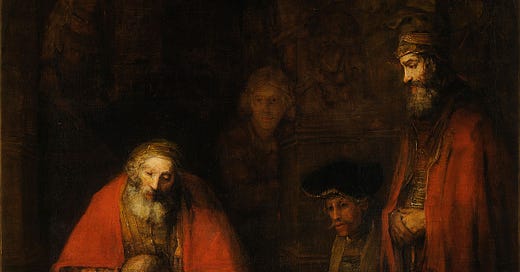Why do we exist? What is the plan behind man’s creation? The Compendium of the Catechism of the Catholic Church (CCCC) presents this both succinctly and profoundly:
God, infinitely perfect and blessed in himself, in a plan of sheer goodness freely created man to make him share in his own blessed life. In the fullness of time, God the Father sent his Son as the Redeemer and Savior of mankind, fallen into sin, thus calling all into his Church and, through the work of the Holy Spirit, making them adopted children and heirs of his eternal happiness. (CCCC 1)
Understanding this is crucial to understanding the very heart of the Christian faith. God wants to adopt us as His own children. Turning to the bible shows us this clearly. At the heart of the Bible lies a profound truth: God’s relentless desire to bring humanity into His family. This is the essence of salvation history—the unfolding narrative of how God works through time to save us. But to grasp this story fully, we must understand it through the lens of covenants—the sacred family bonds God makes with His people.
I talk about covenants a lot. Modern culture is familiar with contracts—legal agreements where two parties exchange goods or services. But a covenant is far deeper. While contracts involve a transaction, covenants involve an exchange of persons and whole lives. When God makes a covenant, He isn’t striking a deal—He is offering Himself in intimate, vowed, relationship.
This is why covenants are sealed by oaths, not mere promises. An oath calls upon the name of God as a witness, implying that breaking the covenant invites divine judgment. We see echoes of this in the familiar courtroom phrase, “So help me, God.” In biblical covenants, God swears to be faithful, and in return, His people swear to live according to His law. This is what binds them into a bond greater than a contract formality, it binds them into the bond of a covenant family. Lumen Gentium teaches:
“The eternal Father, by a free and hidden plan of His own wisdom and goodness, created the whole world. His plan was to raise men to a participation of the divine life. And when they had fallen in Adam, He did not abandon them, but ceaselessly offered them help to salvation, in view of Christ the Redeemer, ‘who is the image of the invisible God, the firstborn of every creature’ (Col. 1:15). All the elect, before time began, the Father ‘foreknew and predestined to become conformed to the image of His Son, that He should be the firstborn among many brethren’ (Rom. 8:29).” (Lumen Gentium 2)
The covenant formula found throughout Scripture is simple but profound: “I will be your God, and you will be My people” (Leviticus 26:12). This isn’t just legal language—it’s the language of family. Through covenants, God adopts us as His own children.
In the biblical world, covenants established family bonds. Treaties between nations often used father-son imagery to express loyalty and kinship. This context is crucial for understanding Scripture. Every covenant in the Bible expands the Family of God—beginning with a couple (Adam and Eve) and widening to include the whole world through Jesus Christ.
St. Paul captures this family dimension when he writes:
“I will live with them and move among them, and I will be their God, and they shall be My people. . . I will be a Father to you, and you shall be sons and daughters to Me, says the Lord Almighty.”
—2 Corinthians 6:16-18
This passage reflects God’s ultimate goal—to draw humanity into the intimacy of divine sonship. The covenants are not just historical milestones; they are steps toward God’s eternal family.
The Progression of God’s Covenants
The Bible reveals a clear covenantal progression:
1. Adam and Eve – A marriage covenant (Genesis 2:24)
2. Noah – A family covenant (Genesis 9:8-17)
3. Abraham – A tribal covenant (Genesis 12:1-3)
4. Moses – A national covenant (Exodus 19:5-6)
5. David – A kingdom covenant (2 Samuel 7:12-16)
6. Jesus Christ – The New Covenant, open to all nations (Luke 22:20)
Each covenant reveals more of God’s character and His desire to draw us deeper into relationship with Him. This journey culminates in Christ, who establishes a New Covenant that fulfills and surpasses all the others.
Through Jesus, God’s covenant family is no longer limited to a single nation—it is open to all who believe. This universal covenant makes us sons and daughters of God. St. Paul emphasizes this new reality:
But when the set time had fully come, God sent his Son, born of a woman, born under the law, to redeem those under the law, that we might receive adoption to sonship. Because you are his sons, God sent the Spirit of his Son into our hearts, the Spirit who calls out, “Abba, Father.” So you are no longer a slave, but God’s child; and since you are his child, God has made you also an heir. (Galatians 4:4-7)
God’s plan from the beginning was to form a family. Through the covenants—culminating in Christ’s sacrifice—we are no longer strangers but beloved children. The New Covenant is not just a legal arrangement; it is an invitation to divine intimacy.
“We can adore the Father because he has caused us to be reborn to his life by adopting us as his children in his only Son: by Baptism, he incorporates us into the Body of his Christ; through the anointing of his Spirit who flows from the Head to the members, he makes us other ‘Christs.’” (CCC 2782).
As we read the Bible, we must see beyond isolated stories and recognize the grand narrative: a Father seeking His children. Every covenant is a chapter in this love story, leading us to the heart of God—where we are called to live as His sons and daughters forever.





